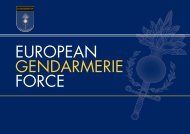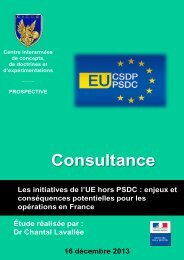Conference
science-research-bulletin-2013-conference
science-research-bulletin-2013-conference
Create successful ePaper yourself
Turn your PDF publications into a flip-book with our unique Google optimized e-Paper software.
EUROPEAN POLICE SCIENCE AND RESEARCH BULLETIN<br />
SPECIAL CONFERENCE EDITION<br />
in mind that the original sense of police science<br />
brought with it the intention of fostering the<br />
social welfare of the individual in society so as to<br />
increase the general health of the commonwealth,<br />
raises issues as to how to normatively orient<br />
global policing towards correspondingly similar<br />
ends? One answer has been represented in the<br />
idea of a Constabulary Ethic (Sheptycki, 2007;<br />
2010; O’Rourke and Sheptycki, 2011). The term<br />
presents difficulties. The word ‘constable’ is illdefined.<br />
In some jurisdictions it carries an excess<br />
of negative connotative meanings, in other<br />
jurisdictions it is incomprehensible because there<br />
has no traditional equivalent concept. In some<br />
places it is linked to a paramilitary tradition in<br />
policing, in others to a civilian office. The term<br />
entered the scholarly lexicon from the sociology<br />
of the military. The first usage of the word<br />
Constabulary Ethic came out of studies looking<br />
at UN peace-keeping troops sent to Cyprus in<br />
the early 1960s. Recognising that military troop<br />
trained from the ‘killing job’ were being asked to<br />
perform a policing function in maintaining the<br />
buffer zone between Greek and Turkish Cypriots,<br />
military sociologists began to think about ways<br />
of fostering a Constabulary Ethic amongst<br />
military troops. Arguably trying to advance the<br />
acceptance of such an ill-defined category is illconceived.<br />
However, the preceding discussion<br />
has shown how global policing has tended to<br />
become trapped in a negative feed-back loop<br />
through processes that are paradoxical leading to<br />
unintended iatrogenic consequences and further<br />
amplification of (in)security. We would argue<br />
that this implies that decisions could be taken to<br />
change the policing practices leading to different<br />
outcomes and so, despite the terminological<br />
difficulties, the idea of a Constabulary Ethic is at<br />
least worth thinking about.<br />
The notion of the Constabulary Ethic is aimed<br />
directly at those persons who inhabit the<br />
occupational world of global policing, at<br />
whatever level and in whatever capacity. The<br />
idea is an intellectual short-hand to indicate<br />
something about the need to proceed as the result<br />
of conscious effort and thoughtful deliberation.<br />
The discretion involved in policing ‘work’ (Bronitt<br />
and Stenning, 2011) can involve the threat or use<br />
of force up to and including lethal force. As we<br />
have stressed, policing is a tainted occupation.<br />
By inserting the notion of the Constabulary Ethic<br />
into the subcultural language of policing we are<br />
providing a linguistic handle on a complex set of<br />
normative problems. Can there be a compendium<br />
of police ‘ethics’; recipe knowledge that can be<br />
listed? That there are efforts in the occupational<br />
world of policing to develop such recipe<br />
knowledge is a hopeful sign. For example, in<br />
some places the JAPAN model was promoted as a<br />
recipe for decision-making in the context of longterm<br />
undercover operations against serious and<br />
organised criminals. JAPAN was an acronym which<br />
stood for the following questions. Is the action<br />
Justifiable? Is it Accountable? Is it Proportionate?<br />
Is it Auditable? And, is it Necessary? The answer<br />
to these questions, and the questions themselves,<br />
are moot. There may be other more appropriate<br />
ways to ask ethical questions about police work.<br />
It is very difficult, if not impossible, to provide a<br />
corpus compendium of constabulary ethics. Even<br />
John Kleinig, whose massive attempt to do just<br />
that, admits that he is<br />
‘… very conscious that every issue canvassed in<br />
this long book cries out for further elaboration<br />
both philosophically and practically. The problems<br />
of authority, role morality, affirmative action,<br />
loyalty, privacy, coercion and deception, to<br />
mention some of them, have generated large<br />
and sophisticated literatures whose complexities<br />
have been barely touched upon … the concrete<br />
decisions that first line police officers and police<br />
managers must make on a day-to-day basis are<br />
more diverse and finely nuanced than the various<br />
situational circumstances to which I have alluded<br />
in the text’ (Kleinig, 1996, p. 2)<br />
The Constabulary Ethic is not the same as trying<br />
to list constabulary ethics; it is a normative<br />
position. How do we understand or describe this<br />
position? Accepting that ‘the police job’ is, in<br />
the final instance, one which involves the ability<br />
to muster coercive force in the maintenance of<br />
social order, in taking on board the notion of a<br />
Constabulary Ethic the person who takes up the<br />
policing role remains a human being first and<br />
as a human being governed by the categorical<br />
imperative can only act in a way that he or she<br />
would expect of any other human being. This<br />
is longwinded Kantianism — act by the maxim<br />
whereby you can, at the same time, will that it<br />
become a universal law. It is also a reaffirmation<br />
of the Peelian notion of the constable as a ‘citizen<br />
in uniform’, perhaps updated for global times.<br />
The police are the public and the public are the<br />
police. The constable is a mere pivot of social<br />
order. All that is policing does not lie with the<br />
police, and the constable is but one part of a vast<br />
social system of order. The normative position<br />
that the Constabulary Ethic recommends is that<br />
of philosopher, guide and friend, accustomed<br />
19





